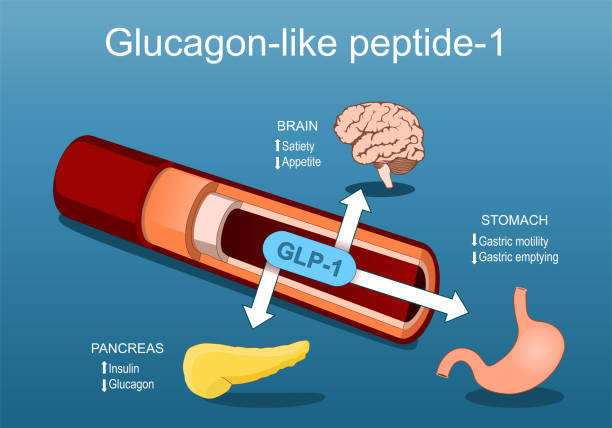Weight Loss Injections: The Surprising Benefits of This GLP-1


Glucagon-like peptide-1 (GLP-1) receptor agonists have gained significant attention as versatile treatments for diabetes, obesity, and cardiovascular conditions. These medications mimic a naturally occurring hormone in the body that regulates blood sugar levels, slows digestion, and suppresses appetite. In addition to these approved uses, researchers are exploring their potential benefits in other areas like Alzheimer’s disease and substance use disorders.
BlackDoctor.org spoke with Karla Robinson, MD and Medical Editor at GoodRx to discuss how GLP-1 receptor agonists work, their therapeutic potential, and the emerging research that points to their broad clinical application.
What Are GLP-1 Receptor Agonists and How Do They Work?
GLP-1 receptor agonists act like a hormone naturally produced in the body, particularly in response to eating.
“These medications act like a naturally occurring hormone. GLP-1 is something your body naturally makes, and it’s normally released in the gut after a meal. It works to lower your blood sugar by telling your pancreas to push out insulin after you eat. It also signals your liver to make less new sugar in the body,” Robinson shares.
For individuals with type 2 diabetes, where these regulatory mechanisms are often impaired, GLP-1 receptor agonists help to mimic these effects.
“The reason why this is helpful is that in type 2 diabetes, these responses are normally blunted or may not be present at all. That’s why these medications are useful to help mitigate that and allow the body to regulate itself after a meal. GLP-1s also work to slow digestion, which helps prevent blood sugar spikes after meals,” Robinson adds.
GLP-1 Agonists and Their Use in Obesity Management
Beyond diabetes, GLP-1 receptor agonists have proven effective in treating obesity. By slowing digestion, these drugs promote feelings of fullness, which can curb appetite and aid in weight loss.
Clinical trials have shown that these medications, when combined with lifestyle changes, lead to substantial weight loss and improve cardiovascular health.
“These medications have been shown to decrease the risk of heart attack and even death in those who are overweight or obese and are at higher risk, by decreasing inflammation and indirectly improving heart function,” Robinson notes.
GLP-1 Agonists in Alzheimer’s Disease and Cognitive Health
There is growing interest in the potential of GLP-1 receptor agonists to slow down or even prevent neurodegenerative conditions like Alzheimer’s disease.
“Some early data suggests that GLP-1s may have a neuroprotective effect against Alzheimer’s. They may help protect the brain in people with early stages of dementia. Researchers are looking at how these drugs might decrease inflammation and reduce the plaques that build up in the brain, which are associated with Alzheimer’s. It’s an exciting area of study,” Robinson shares.
Animal studies have shown promise, but more human trials are needed to confirm these benefits.
Beyond Alzheimer’s, researchers are also exploring GLP-1 agonists for other conditions like substance use disorders and smoking cessation. Preliminary data indicates that GLP-1 agonists may reduce cravings and relapses, but again, these findings are mostly from animal studies and need further clinical validation.
The Synergistic Effects of GLP-1 and Other Diabetes Medications
One area of excitement in diabetes research is the potential synergy between GLP-1 receptor agonists and other compounds, such as those that promote pancreatic cell regeneration. In type 1 diabetes, where pancreatic cells that produce insulin are destroyed, a treatment that can regenerate these cells could revolutionize care. While research is still in early stages, this approach holds promise for more effective diabetes management in the future.
“Diabetes is a condition where there’s either a lack of insulin production or the body isn’t using insulin effectively. If we can regenerate more pancreatic cells that produce insulin, it could be a game changer, particularly for type 1 diabetes, where these cells are no longer functioning,” Robinson says.
Expanding Therapeutic Applications of GLP-1 Agonists
In addition to diabetes, obesity, and Alzheimer’s, researchers are exploring other potential uses for GLP-1 receptor agonists, including sleep apnea, another condition often linked to obesity. By addressing the root cause—excess weight—GLP-1 agonists may help reduce the severity of sleep apnea symptoms.
With their anti-inflammatory properties, these medications could also benefit individuals with chronic inflammatory conditions.
“There’s still so much to learn, but it’s a very exciting time in medicine as we uncover more about the potential benefits of these medications,” Robinson shares.
The Importance of Diversity in Clinical Trials
One critical area for improvement in GLP-1 research is the inclusion of diverse populations in clinical trials. Currently, there is a lack of data on how these medications affect people of color, particularly Black Americans, who are disproportionately affected by conditions like diabetes and obesity.
What to Consider Before Taking GLP-1s
The list of benefits of GLP-1 receptor agonists continues to grow. From blood sugar regulation and weight loss to cardiovascular protection, these drugs are transforming the treatment landscape for diabetes and obesity. However, as more data emerges, so do potential risks and side effects. Gastrointestinal issues such as nausea, bloating, and diarrhea are common, but there are also concerns about the risk of thyroid cancer, mental health effects like depression, and even suicidal thoughts.
If you are considering GLP-1 receptor agonists, it’s important to have thorough discussions with your healthcare providers, weighing both the potential benefits and risks.
“While GLP-1s are exciting, they’re just one tool in the toolbox for managing these conditions. They aren’t a magic bullet. It’s important to develop a treatment plan that works for your health goals and medical history with your provider. For some, GLP-1s may not be a good option, and it’s critical to know there are other treatments available,” Robinson advises.
For healthcare providers, staying updated on the latest research and clinical guidelines surrounding GLP-1 receptor agonists is essential.
“Healthcare professionals should stay up to date with evidence-based studies to fully understand these medications, their indications, side effects, and the emerging data. It’s important to communicate to patients that GLP-1s are just one part of a long-term treatment plan for chronic conditions like diabetes and obesity,” Robinson concludes.
If cost is a concern, resources like GoodRx can help you find discounts, copay savings, and patient assistance programs to make treatments more affordable.




